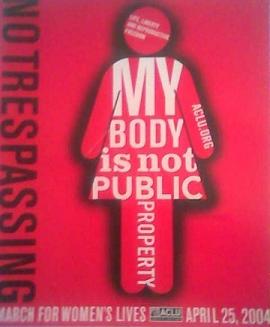(Via The Hand Mirror 2008-06-11, via The Hand Mirror 2008-06-17, via comments on feministe 2008-06-16.)

New Zealand’s abortion law, unlike, for example, the United States’s existing case law, does not recognize a basic privacy right to abort a pregnancy without government interference. The law is restrictive in theory, but applied fairly liberally in practice; like many abortion law reform
proposals that were entertained in the United States in the years shortly before Roe v. Wade, it requires a woman to get permission from institutionally-privileged consultants
before she can get an abortion, but the criteria for permitting a therapeutic abortion are broad enough (especially under the heading of the pregnant woman’s mental health
) that they can be, and are, handed out pretty liberally. But as Cindy Cisler pointed out in 1969, no matter how superficially liberal an abortion law regime may be, these kind of requirements for mediating reproductive choice through politically-anointed medical experts are really a dangerous trap, just waiting to be sprung. Thus, witness Justice Forrest Miller’s recent ruling on the workings of the Kiwi Abortion Supervisory Committee:
In a review of the workings of the Abortion Supervisory Committee, initiated by Right To Life
New Zealand, Justice Forrest Miller said there was a reason to doubt the lawfulness of many
abortions.
Jusice Miller was delivering his judgment following a hearing at the High Court at Wellington in
April.
Right to Life had claimed the Abortion Supervisory Committee had failed to properly interpret
the Contraception Sterilisation and Abortion Act, so full regard is given to the rights of
unborn children
.
It sought to find the committee had failed its statutory duty to review the procedure for
abortions and enquire into the circumstances in which consultants authorised abortions on
mental health grounds.
It said the committee had failed to seek proper information on the mental health grounds
from consultants.
It also sought to find the committee had failed in its duty to ensure adequate counselling
facilities were available.
A registered practitioner can only lawfully carry out an abortion if they act under a
certificate issued by two certifying consultants.
The Abortion Supervisory Committee said it had no power to review or oversee the
clinical decision-making process
.
It denied New Zealand had abortion on request
, and said there was no evidence of
this.
In his judgment Justice Miller found the Abortion Supervisory Committee had applied the
abortion law more liberally than Parliament had intended.
There is reason to doubt the lawfulness of many abortions authorised by certifying consultants,
he said.
Justice Miller said the abortion law neither confers or recognises
a legal right to life of the unborn child.
However, he said the Bill of Rights, through the abortion law, had recognised the unborn child had a claim on the conscience of the community, and not merely that of the mother
.
— stuff.co.nz (2008-06-10): Abortion law being used too liberally
Give me a call when the fetus has a claim on the bodies of the community, and not merely that of the mother.
Then maybe they can have something to say about it. In the meantime, though, as long as it’s just weighing on their consciences and not on their abdomens, it really is merely
the mother, not the rest of the community, whose conscientious deliberation ought to matter when it comes to continuing the pregnancy. Of course, the bellowing busybody blowhard brigade has every right to be just as loudmouthed as they want to be, on their own time, in their own space, and on their own nickel, about what their consciences
tell them ought to happen in other people’s wombs. But certainly neither they, nor the government, has any right to commandeer another woman’s reproductive system against her will, or to coerce her into even one more day of pregnancy or forced labor for the sake of satisfying their own qualms.
Abortion on demand and without apology.
See also:
